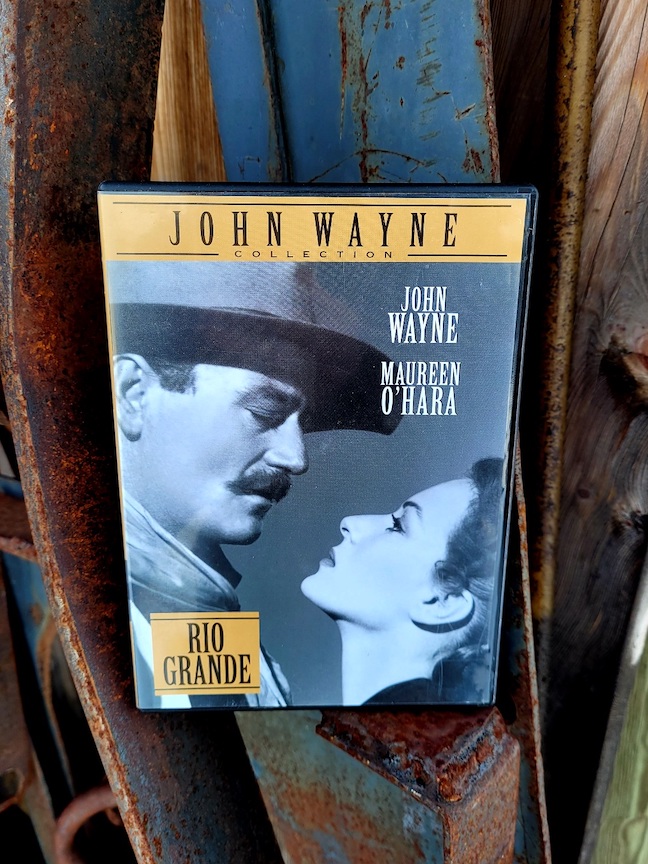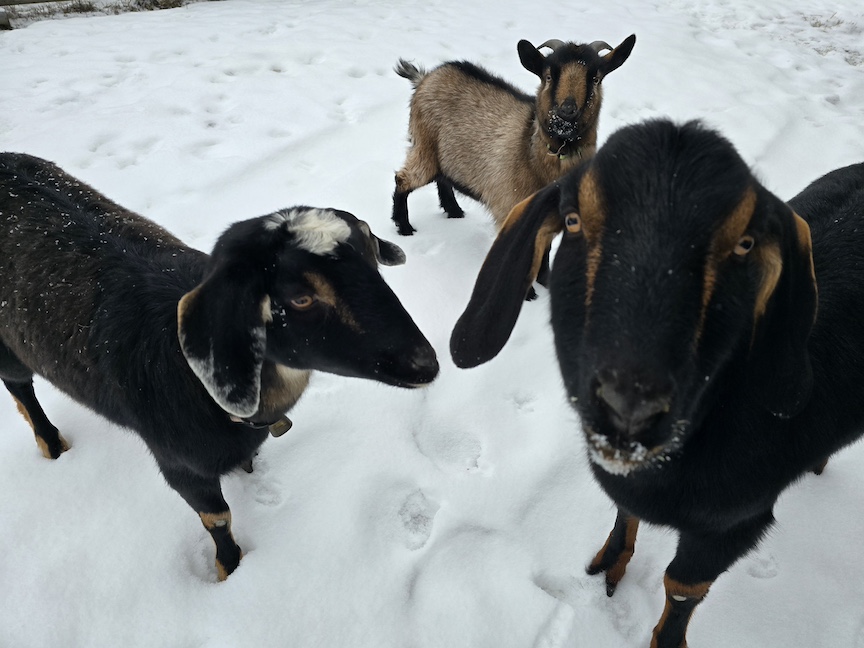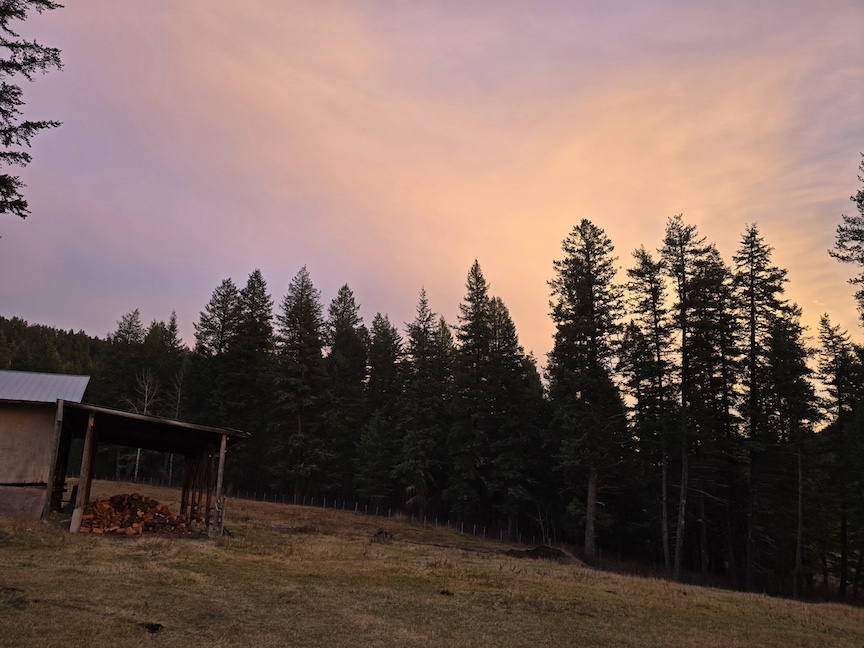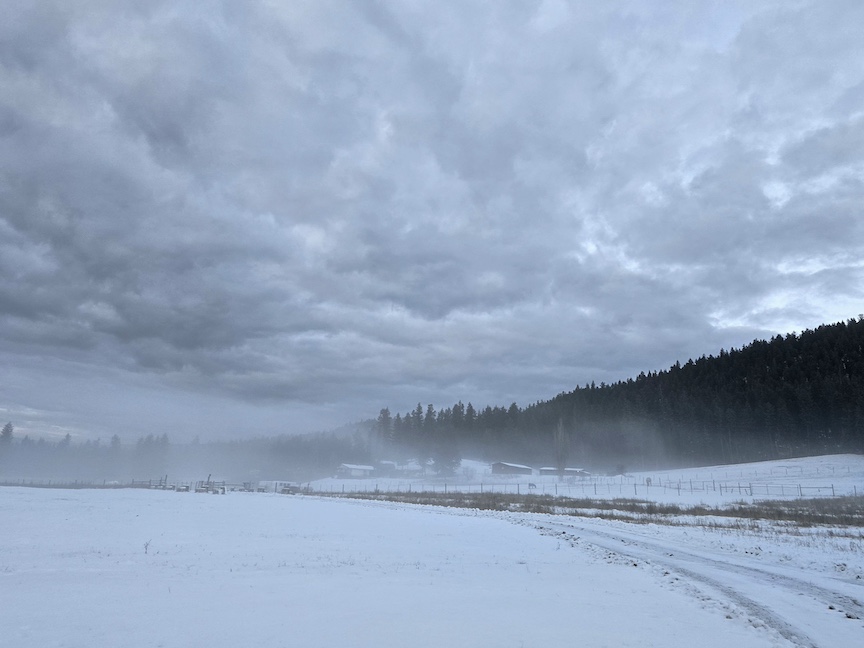Starring: John Wayne, Maureen O’Hara, Ben Johnson
Director: John Ford
Released: 1950
Mood: If you’re looking for love but make it a cavalry Western.
I had recently finished reading an absolute crap Western novel, and was feeling pretty sorry for myself. I needed to watch a guaranteed winner of a Western to erase that nasty memory, and Rio Grande shone like a beacon from atop the little stack of borrowed DVDs by my TV.
That’s right, I’m a good person who keeps borrowed items in plain sight yet far from my personal collections so they don’t get mixed in. You can trust me with your shit. I’d borrowed Rio Grande off my brother, who has so many DVDs that his shelves are two rows deep. Having a massive DVD collection runs in my family – we keep it oldschool.
The only notion I had going into Rio Grande was that I liked John Wayne in The Man Who Shot Liberty Valance, also directed by John Ford, so hopefully this would be at least as good.
Well.
This might be the first movie that I never return.

Rio Grande takes place in 1879, if you go by a conversation between characters referring to time passed since an 1864 regimental campaign. It’s based on a short story by James Warner Bellah, and set mostly at a small border camp near the Rio Grande.
It’s billed as a romance and Western, in that order. I LOVE black and white movies, and there’s a closet romantic behind this profanity-laden website, so I was swept away by the swelling music of the opening credits.
A cavalry unit rides back into camp. Women line up anxiously along the dusty road, scanning each soldier’s face, searching for their men.
Lt. Col. Kirby Yorke (John Wayne) acknowledges the work of his men, then dismisses them. But get this – he says, “When you’re dismissed, you will walk your horses for half an hour, then water and picket them.” He literally orders his men to be good to their horses. I felt like John Wayne was romancing ME in that moment.
Rio Grande’s early scenes are filled with random lines about proper horse care, as the young soldiers train with their mounts. And then you see two stunt riders gallop around a track standing – STANDING! – on two horses each, and sail over a massive jump! I swear I clutched my non-existent pearls.
Lt. Col. Yorke learns that one of the newest arrivals is his own estranged son, who flunked out of West Point. They share a brief, cold exchange about how he will be treated like everyone else and how he didn’t ask to be there.
Oh, but then his estranged wife Kathleen shows up (Maureen O’Hara) to try to buy her son out of his post! I learned from the IMDb trivia that the reason they were separated for that 15 years is because she was from the South, but he remained in the Union Army after they married and possibly participated in a campaign that destroyed his own home out of duty. I have NO idea how you could get that from the movie, but there you go.
There are a lot of long looks intensified by forlorn melodies, and you can just feel the history between them. But of course there has to be a challenge they face together, and that challenge is Apache attacks, kidnapping, and the unit being ordered to hunt the Apache warriors across the Rio Grande into Mexico.
In a beautiful symmetry, the movie’s last scene begins with Kathleen lined up along that same dusty road, watching the troops ride back into camp and searching for her boys.

I don’t mean to make it sound like it’s all romance and no punch. From those first horse stunts to the chases and battles, this is a f*cking WESTERN. But it’s definitely one for the lovers.
Speaking of lovers: holy shit, what a beautiful pair of actors leading this cast. This was actually my first time seeing a young(er) John Wayne, and what a FOX. He even had a great moustache!
And oh, Maureen O’Hara. To quote Ms. Veda Boheme: Try to describe her and not use the word ‘statuesque’. That jawline. Those eyebrows. Those faraway looks with trembling lips. You can see why these two were snapped up to co-star in four more movies after Rio Grande.
Objectification aside, they also give great performances. There’s a bit of overacting from everyone in this movie, but that was the style for romantic movies in the ‘50s. Every reaction had to have that drama.
Far from the caricature of himself that his later performances became, Wayne delivers a progressive array of manly emotions ranging from formal and stoic to sweet. O’Hara is simply perfection, although as with most ‘50s Westerns the female role isn’t particularly demanding.
Doc Wilkins (Chill Wills) is another standout. That man’s facial expressions make you forget everyone else in a scene. He brings this warmth and cheekiness, which balances the family drama.
As an added bonus, you get to see sweet, a babyfaced Ben Johnson, whom I knew and adored in his later movies like The Sacketts and The Shadow Riders.

There are a few downsides to Rio Grande, which I hate to mention since I am obviously in love with it. But in the name of unconditional love, let’s shine a light on those imperfections.
While I enjoyed the songs performed by the Regimental Musicians (real band: Sons of the Pioneers), they definitely felt very ‘modern’ and distracted from both the era and the action.
The ending also felt a bit too Disney. I guess I saw it coming, given that most of the actors clearly didn’t know how to shoot a gun and the weakness of the acting in the battle scenes.
Harry Carey Jr., who plays Lt. ‘Sandy’ Boone, described Rio Grande as one of director John Ford’s ‘vacation’ pictures – as in, nobody making it took it seriously. Apparently Ford only agreed to direct it to secure financial backing for The Quiet Man, his big-budget 1952 film also starring Wayne and O’Hara.
And of course the portrayal of the Native Americans is shitty. This was the ‘50s; it’s shocking that they even cast actual Native Americans. In this case, 50 Navajo people and a translator were apparently brought in from a reservation near the shoot location to play the Apache people… but they weren’t told that they were playing Apaches.
Rio Grande doesn’t lay heavily into stereotypes or anything. But having recently watched Geronimo, it was hard to switch gears to this story that depicts the actions against the Native Americans as highly favourable.
That said, the cinematography is rich and attractive, and the story is super engaging. I will definitely watch this movie again and again. I honestly enjoyed it more than Liberty Valance (gasp!) because it felt more like a proper Western, whereas that film was kind of a political drama.
I definitely recommend Rio Grande for a cuddle-up Western movie night. Is that a thing? It’s a thing. Now excuse me while I go hunt down more Wayne-O’Hara Westerns!


